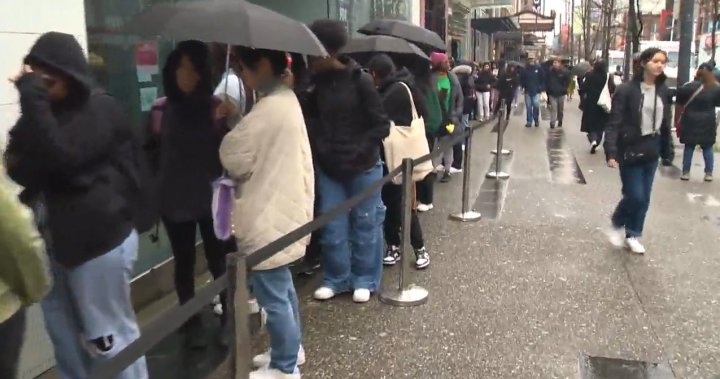Hundreds of shoppers lined Granville Street in downtown Vancouver for the opening day of a Shein pop-up store, the first of its kind in the city. Shein is a primarily online Chinese fashion store known for its incredibly cheap prices. However, the company has faced allegations of forced labor and unsafe working conditions in the past, which it denies. Shein stated that all suppliers must agree to abide by their Code of Conduct, which promotes safe and fair conditions across the supply chain. Despite these allegations, the pop-up store in Vancouver was a hit, with many shoppers waiting in line for over an hour to get inside.
The popularity of Shein and other fast fashion brands can be attributed to their ability to release hundreds of new items every day, keeping their audience engaged. A Kwantlen Polytechnic University psychology instructor pointed out that the fast fashion model appeals to a young audience looking for affordability and virality. It taps into the fast-paced, ever-changing trends that are popular among buyers. This indicates that the allure of fast fashion, despite its controversies, continues to resonate with consumers today.
The Shein pop-up store in Vancouver serves as a testament to the brand’s ability to attract a large number of shoppers, despite the negative reputation it has garnered in the past. The company’s success can be attributed to its competitive pricing and vast selection of trendy clothing items. While concerns about forced labor and unsafe working conditions remain, Shein’s presence in the fashion industry continues to grow, appealing to a younger demographic looking for affordable and stylish clothing options.
The controversy surrounding Shein’s labor practices raises questions about the ethical implications of supporting fast fashion brands. Critics argue that the industry’s focus on producing cheap clothing at a rapid pace often comes at the expense of workers’ rights and well-being. Despite these concerns, the demand for fast fashion brands like Shein remains strong, driven by consumers seeking trendy, affordable clothing options. This highlights the need for greater transparency and accountability within the fashion industry to ensure ethical practices are upheld.
The Shein pop-up store in Vancouver highlights the enduring popularity of fast fashion brands among consumers, despite ongoing criticisms of their labor practices. This raises broader concerns about the fashion industry’s reliance on unsustainable production practices and the exploitation of workers in developing countries. As consumers become more conscious of the impact of their purchasing decisions, there is a growing demand for brands to prioritize ethical and sustainable practices. The success of Shein and other fast fashion brands underscores the need for greater awareness and accountability within the industry.
In conclusion, the opening of a Shein pop-up store in Vancouver drew large crowds of shoppers eager to purchase the brand’s affordable and trendy clothing. Despite allegations of forced labor and unsafe working conditions, Shein’s popularity remains strong, particularly among young consumers seeking fast-paced, ever-changing fashion trends. The continued success of fast fashion brands like Shein raises important ethical concerns about the industry’s labor practices and environmental impact. As consumers become more conscious of these issues, there is a growing demand for greater transparency and accountability within the fashion industry to ensure that ethical standards are upheld.















